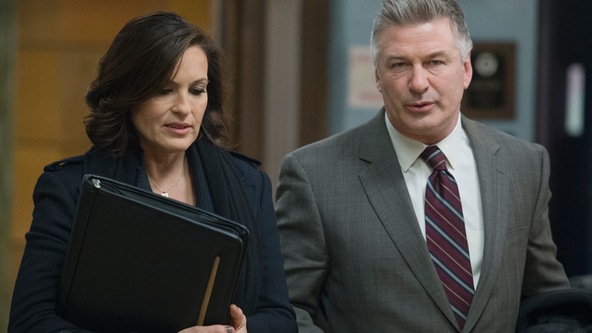
Law & Order: Special Victims Unit has been around a long, long time: Fifteen seasons, to be precise — just five behind Law & Order, the franchise’s flagship series, which wrapped up its final season in 2010. It’s a quintessential procedural, meaning plot developments and character arcs are largely confined to a single episode. By its very nature, SVU doesn’t generate scores of theories, win awards or shock its viewers.
Every so often, though, SVU registers on the pop culture radar thanks to an especially outrageous story ripped from the headlines or a noteworthy guest star. Mar. 19 marked one of those occasions, thanks to Alec Baldwin’s return to network television for the first time since 30 Rock ended in January 2013. The bigger reason that NBC had so heavily hyped Baldwin’s role is the actor’s February essay in New York, in which he declared he was leaving public life. (There’s been little mention of the fact that Baldwin trashed MSNBC, the network’s cable news channel, in the piece).
Of course, because this is Law & Order, Baldwin played a “larger than life” reporter — a role not too distantly related to the sort of paparazzo that Baldwin has decried and waged war against in recent years. In an odd twist of fate, Baldwin began filming the role on the day that his essay was published. According to Today, Baldwin has also earned the unique distinction of contributing to a script for an episode of the original Law & Order (in 1998, about his run-ins with paparazzi) and then later appearing as a guest star. Adding to the “must-see”-ness of last night’s episode was the fact that Mariska Hargitay, better known to the show’s fans as Sgt. Olivia Benson, made her directorial debut.
If you’ve ever seen an episode of SVU, you can probably guess Baldwin’s character down to a couple details. He’s a legendary newspaper columnist, the kind that only exists in the Law & Order universe (or the mid-19th century), where the words of one journalist have total control over the opinions of all New Yorkers. Predictably, Baldwin’s character is a bull in a china shop throughout the episode, writing inflammatory front page stories (rarely based in fact) that nearly ruin the life of a Muslim rape victim. He’s basically the embodiment of Baldwin’s take on the media, and with the motto to match: “Jimmy Mac don’t retract, he don’t apologize, he don’t explain.”
In the episode’s final act, Baldwin’s character has a change of heart and finally sees the light, turning on the privileged rapists and writing a column decrying his paper’s unethical practices. The new Jimmy Mac is basically the embodiment of Baldwin’s take on how the media should be.
If all that seems a little too tidy, it’s important to remember that this is Law & Order we’re talking about. The entire beauty of the show is that you could have watched an entire episode, enjoyed it and forgotten it by morning.
More Must-Reads from TIME
- Why Trump’s Message Worked on Latino Men
- What Trump’s Win Could Mean for Housing
- The 100 Must-Read Books of 2024
- Sleep Doctors Share the 1 Tip That’s Changed Their Lives
- Column: Let’s Bring Back Romance
- What It’s Like to Have Long COVID As a Kid
- FX’s Say Nothing Is the Must-Watch Political Thriller of 2024
- Merle Bombardieri Is Helping People Make the Baby Decision
Contact us at letters@time.com